
Ian Payne 4am - 7am
31 December 2019, 09:52

New figures show police have investigated thousands of children for "sexting" offences over the last three years with the youngest being just four-years-old.
Data obtained by the Guardian newspaper suggests 6,499 children under 14 have been investigated by police for taking or sharing indecent images of themselves or other minors.
27 police forces responded to a Freedom of Information request from the newspaper and the figures even show 306 cases of children under 10 being investigated, of those 17 were aged six, nine were five and four of those investigated were just four-years-old.

The police said all were classified as suspects despite being below the age of criminal responsibility - meaning no action could be taken against them.
The FoI figures showed a rise in police investigations for such offences, from 183 a month in 2017 to 241 a month in 2019 so far.
Only 30 of the 6,499 cases resulted in a charge, caution or summons for the child.
Most probes were dropped because it was not in the public interest to take formal action, according to the newspaper, a decision that was usually taken when the sexting is consensual.
Of the 6,499 cases, the Guardian said the overwhelming majority were classed as Outcome 21.
Outcome 21 allows police to record a crime as having happened but no formal action is to be taken.
It can only be used in cases where there is no evidence of exploitation, grooming or malicious intent.
Simon Bailey, the chief constable of Norfolk Constabulary and the national police lead for child protection, said safeguarding was the primary focus of investigations into sexting.
He said: “We will not criminalise children unnecessarily and saddle them with a criminal record when the evidence suggests the sharing of images was consensual, but legislation and crime recording standards require officers to record that a crime has happened. We continue to review our response, including when to name someone as a suspect, victim or witness.”